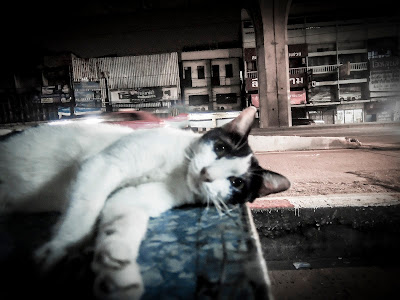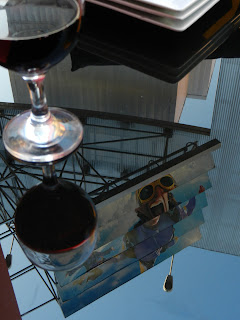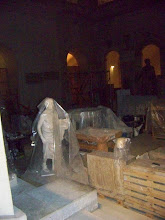I’ve travelled a lot, far beyond the norm of my class and
culture (working class Chicano), and for years my friends and family would tell
me, “Take lots of pictures!”
I told them I’d write to them instead, because I wasn’t
going to take a camera.
I went to countries I had never expected to visit, Cuba,
Poland, Germany, but I never brought a camera, because I believed that to
travel with a camera would distract me from experiencing the cities I entered.
And maybe for me, back then, I
was right.
Maybe I would have went into a new country or city concerned
with finding a good photo and would have missed out on all the experiences I had
walking alone at any hour.
I remember walking by myself in Warsaw at two in the
morning, collecting memories, the light and the glass, the shadows, and I
didn’t need or want a camera.
The last time I spent the summer living in Paris, I used to
look down on tourists with cameras, silently scoffing at them, impatient with
them because there they were trying to get the Eifel Tower in every shot, and
because at the Louvre, they clamored around the Mona Lisa, her smile protected
behind glass, and they stood on tippy toes and shot unfocused pictures of her, her features lost in the glare of their own flash.
And because I was “living” there, i.e., renting an apartment
in the Place Godot, across the small plaza from Picasso’s Paris studio, I felt
like I was somehow not a tourist.
I wouldn’t have been seen carrying a camera, but one time,
as I stood smoking a cigarette in front of the grave of Julio Cortázar, a young
Argentine woman asked me if I would take a photo of her and his tombstone, and
she handed me her point-and-shoot.
I took it quick, a bit too eager to hand it back to her and get
out of there.
I saw what a good camera could do. As you
know, the initials stand for Single Lens Replacement, because they have good,
stable bodies and various levels and types of lenses. I have four lenses now,
which I fit into the body of my camera, depending on the shot I want to
capture.
I’m also going to visit the grave of Borges, who is buried in
Geneva.
And I want to take pictures.
Getting that camera made me face what I had been avoiding
all my life:
I am my father.
He took pictures, built his own dark room in our garage, had
thousands of dollars in equipment, lighting, meters, lenses, and a plethora of
cameras.
I have been wanting to take pictures all my life, but I
denied that part of me, because to accept that I was a photographer was to
accept that I was my father’s son, but now, a bit less concerned with my image
of self, my father now old and under dementia, I have given into the lens of my
father.
I am my father.
 |
| My father took this shot circa 1968. The women with the black coat and blonde hair is my mother. Not sure who the others are. |
I take a camera everywhere,
usually my SLR.
Now I see what a self-righteous tourist I was when I “lived”
in the Place Godot.
Now I don’t care what I think of me.
I’m no longer trying to impress myself with images of my
self.
When we travel, I have my camera and I take pictures.
So screw you
self-righteous Chacón “living” in Paris.
(And if there’s no change of season, how can you say you’ve lived somewhere? At most, you spent one
summer there).
Now I just want to take pictures, and now I try to blend in
as a tourist, so I can take street photography and get candid shots, although
what I think is beautiful may not have anything to do with the monuments that
make the city I’m visiting so famous and full of tourists.
Photos are like haikus or short poems, short moments, images
that somehow capture what I am capable of feeling.
This is one way of saying what a powerful photo contains. A good
photo is a glimpse into the sublime. In an earlier post, I’ve talked about the
image as a wormhole, and I guess if I were to try and say what it is I seek in
an image, I’m seeking wormholes.
Like most little kids who grew up to be writers, I’m still
looking to get glimpses into parallel universes, and strong images do that for
me.
Here's a photo I took at Dinah's in West LA.
This photo, if you look close, there seems
to be some long-robed angel looking over the scene.
 |
| See her in the long robe? This is not photoshop. This was in the image and although I may not have been aware of it at the time, it may be one of the reasons the image struck me and I shot. |
This image struck me before
I noticed this detail.
The image is a Jacob’s ladder. It reaches through the veil and allows me to see other
realities, to see light spilling from the other side.
Well.
Sounds dramatic, but you get the point.
So this summer Sasha and I will be travelling to Italy, and then we'll spend most of the summer in Paris.
I planned on bringing my SLR,
but then an idea came to me.
Why not play with resistance by NOT taking my SLR, but
taking my point and shoot instead?
Like most photo geeks, I have a point-and-shoot that I slip
in my pocket, in case I see a texture that I might want to use later in Photoshop,
a stone wall, a brick bridge, clouds in the sky.
I use a Coolpix S9100.
It doesn’t have automatic capability, and you cannot shoot
in raw, but it takes pretty good pictures.
All the pictures in this entry, other than the ones taken by
my father, are taken with the Coolpix S9100.
So the challenge is this: I’m leaving my SLR at home.
I want to push the boundaries of this point-and-shoot, know
how to use it so intuitively that every setting, every condition of light and
depth, will come to me as if from my body, and snap! I’ll get the perfect shot.
I want to work within the limitations of the camera, to push
its boundaries.
If there is a shot I cannot take, I want it to be because the
camera is not capable of taking that shot, not because I wasn’t quick enough on
controls to know what setting I should have used, and like in every
point-and-shoot, there’s a lot of them.

Close-up, Food, Museum, Pets,
Night landscape, Indoor party, Snow, Beach, and on and on. . .

Can I outgrow a point and shoot?
I want to try.
I want to know the limitations of the Coolpix so that I can
truly know when the SLR is necessary. Under what circumstances would it not be enough?
A Coolpix S9100 might be enough for me.
One of my photo heroes is Henri Cartier Bresson, whose Paris
street photos are among the best, helping to define the genre of street photography,
and he shot everything with a Leica 55mm. One
lens, one camera for everything
he shot.
And let’s face facts: The Leica is a great camera, but the
technology back then cannot compare with what your average point-and-shoot can
do today.
Today an iPhone camera has a lens has an f stop of f2.4, letting in more light than the most expensive lenses on my SLR.
What if I find in doing this experiment that my SLR might be
more for my ego than necessity?
I’ve even been tempted to buy an better SLR than the one I
have now, which is a Nikon D5000, which many camera geeks will tell you is a
starter camera.
But before I feed my ego and upgrade my amateur equipment, I
want to know in my gut why I need a “better” camera.
This concept reminds me of my father, the photographer:
When I was a kid, I wanted to play electric guitar and be in
a rock band. I was going to be famous.
I was going to play lead guitar so hauntingly that it would
be spooky.
 |
| This is me when I wanted to rock out, taken by my father. |
But I needed the best electric guitar out there, professional
like the ones used by my guitar heroes, Santana, Jimmy Page, Peter Frampton.
For Christmas one year I asked
my parents for a Gibson with a Marhsall amp.
“Horse crap!” my dad said. “You
don’t even know how to play.”
I reminded him that I was taking
lessons.
On Christmas, my parents did get me an electric guitar, and
although it was a used generic brand, it was nice.
They didn’t get me an amp, but my dad hooked up a speaker
for me that he found at the secondhand store, and he put a chord in my guitar
and it worked, a tinny, distorted sound, but it worked.
“If you outgrow this
equipment,” my father said. “I promise you I’ll get you a better amp.”
I never did out grow it.
I quit playing guitar.
And although I don’t think I’ll give up taking pictures any
time soon, let’s see if I outgrow the Coolpix S9100.
All pictures taken on the Coolpix S9100




































































